FTM Health and Well-being Holistic Care for Body and Mind
FTM transition is a holistic process involving physical, psychological, and social changes that affect your health and quality of life multi-dimensional. Therefore, consider taking extra care of yourself while transitioning to avoid complications.
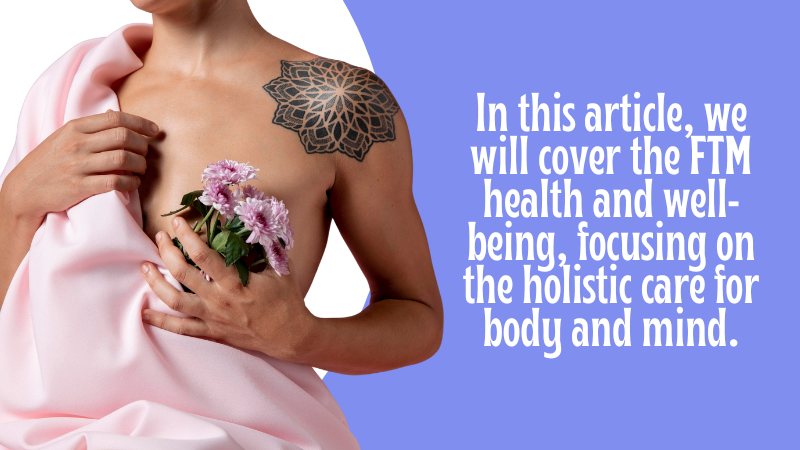
In this article, we will cover the FTM health and well-being, focusing on the holistic care for body and mind.
Physical Health Aspects
FTM health and well-being involve various physical health aspects you should evaluate during the transition process.  For instance, as an FTM individual, you may choose to undergo surgical procedures, laser hair removal, and gamete storage.
For instance, as an FTM individual, you may choose to undergo surgical procedures, laser hair removal, and gamete storage.
Here are the physical health aspects:
Hormone Replacement Therapy (HRT)
By choosing masculinizing hormone replacement therapy, the surgeons introduce testosterone to the system to achieve physical changes that better fit with your gender identity. Therefore, health providers and surgeons should constantly monitor and manage dosage and delivery methods such as injections, gels, patches and pellets. They can do so by ensuring they consider each of the methods with their effectiveness concerns to ensure you get the best results.
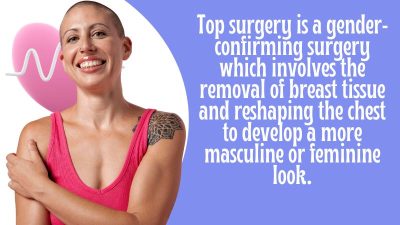
Surgical Options: Top Surgery, Bottom Surgery, And Their Implications for Physical Health
Top surgery is a gender-confirming surgery that involves the removal of breast tissue and reshaping the chest to develop a more masculine or feminine look. Bottom surgery entails a restructuring of the sexual organs to conform to your preferred sex.
There are various implications of surgical options, such as pain after the surgery, more extended recovery periods that interfere with daily activities, risk of infection, blood clotting, changes in skin sensation, and dark scars.
Mental Health Considerations

While undergoing the different stages of transitioning, it’s also essential that you focus on mental health. A few mental health considerations include:
Addressing Mental Health Challenges During FTM Transition
Transitioning comes with some mental health challenges that may make you feel discouraged or give up. As an FTM individual, you have to fight the emotional stress of coming out in front of your families, friends and colleagues. You also have to deal with the stress that comes from the changes in the physical features of gender identity at different stages.
The Impact of Hormone Therapy on Mental Well-Being
While the initiation of HRT brings relief from gender dysphoria, it also causes numerous psychological changes. You should monitor the impacts to determine the need for psychological support. These effects include mood swings, fatigue, insomnia and other effects introduced by endocrine changes related to testosterone intake. You may experience mild to severe effects that may result in interference from your routine.
Fitness and Nutrition Guidance

An essential element to consider is fitness and nutrition guidance when transitioning because it will give you the energy you need.
Here are some nutrition and fitness guidance:
Tailored Exercise Routines for Developing a Masculine Physique
You can develop personalized fitness regimens that include exercises for muscle building, such as bench presses, deadlifts, pull-ups and overhead presses. You can also do exercises targeting bodybuilding, such as barbell curl, cable rows, and military press, to derive a more masculine physique. While doing these exercises, ensure you have the strength, consistency and endurance.

Nutritional Considerations for Overall Health and Well-Being
While transitioning, you must monitor the calories, protein, vitamins, and minerals you consume under your activity levels. Remember, you consume proteins and vitamins to build your body and give you the muscles and strength you need to perform daily activities. However, when you drink too much, you may have various negative effects, such as weight gain; therefore, ensure you control your intake.
Voice Masculinization

Deciding on a suitable mode of voice training is central to the meaningful realization of an adequate level of voice masculinization that suits your felt gender identity. You can either consider home practice exercises targeting pitch, resonance and tone. Another method is that you may consider engaging a speech-language therapist for modification of vocal range and quality without the imposition of stress or harm to vocal cords.
Sexual and Reproductive Health
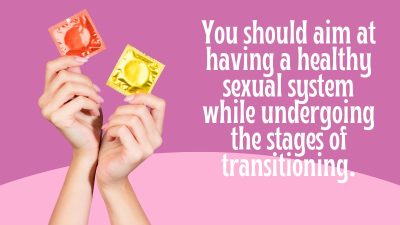
You should aim at having a healthy sexual system while undergoing the stages of transitioning. To achieve a healthy sexual system, you may consider the following:
Safe Sexual Practices During and After Transition
Starting the journey of transitioning on the sexuality spectrum necessitates revising your knowledge of your needs. You can also mitigate the risks regarding sexual activities by having safer sex practices, such as using condoms, which helps in the prevention of STIs and infection transmission. Consider having candid conversations with current and potential partners about libido changes, physical sensations and gender affirmation factors during intimacy.
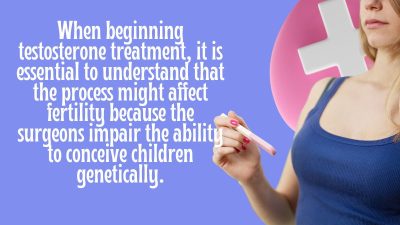
Fertility Considerations and Family Planning
When beginning testosterone treatment, it is essential to understand that the process might affect fertility because the surgeons impair the ability to conceive children genetically. Therefore, you may consider freezing eggs or embryos as preventive options to leave the chances for future family planning.
Grooming and Personal Care Tips

While transitioning, you should at least have personal care and grooming tips that work for you and give you the confidence to handle life positively in transitioning.
Here are some tips
Grooming Routines for a Positive Self-Image
Adopting grooming routines such as tailoring skin, hair, and nail care techniques that suit you best and bring out your masculinity plays a significant role in transitioning. Consider clothes and dressings that fit you and go well with your body size. Clothes will give you the confidence you need while going through your transitioning journey.
You can also experiment with several facial hairstyles that will suit your face shape perfectly. Select the range of beauty products and tools for gender-affirming versions that will help to build confidence. You will achieve a positive image when you match the external presentation to your internal conception of self.

Skincare and Hygiene Practices for FTM Individuals
For perfect skincare and hygiene practices, you can incorporate proper cleansing routines, and moisturize your skin to gain hydrated skin. Apply shave practices to prevent irritation and plan excellent post-operative care if appropriate. You may consider regular follow-up of screening tests related to ongoing trans masculine health, to ensure you achieve the best skincare and hygiene practices.
Community and Support Resources
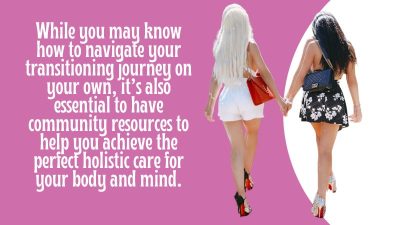
While you may know how to navigate your transitioning journey on your own, it’s also essential to have community resources to help you achieve the perfect holistic care for your body and mind.
The support and community resources include:
LGBTQ+ Organizations Providing Health-Related Resources
Good relationships with community groups in the area you stay that continue with LGBTQ+ advocacy activities and offer access to trans-friendly networks of service providers, such as therapists, doctors, and surgeons, help with the transition process. Also, resources such as the American Medical Association provide health literature to gain information while transitioning.

Support Groups and Forums for Sharing Experiences and Seeking Advice
The nature of socializing with support groups makes the transition easy and enhances community, solidarity, and mentorship from other individuals in different stages of transitioning. For instance, online support groups include, the Trevor Project, best for young people in crisis. The tribe is best for mental health and The gender spectrum is best for teens and their parents.
FAQs

The most asked questions on FTM Health and Well-being include:
How can I manage mental health challenges during the FTM transition process?
During the FTM transition process, you can manage mental health challenges by developing resilience practices such as meditation, self-care routines, and healthy strategies to facilitate the demanding process smoothly.
Are there specific exercises to enhance muscle development and body masculinization?
Indeed, these exercises include shoulder presses, bench presses, deadlifts, pullups, and squats which enhance muscle development and body masculinization.
What nutritional changes can support my overall well-being during the transition?
Eating foods with numerous nutrients, such as vitamin D, calcium, iron, zinc, and magnesium, will strengthen bones and skin.
How does hormone therapy impact sexual health and libido?
Testosterone therapy commonly amplifies sexual desire via increased arousal, sensitivity, and pleasurable feelings that eventually occur over time.
Are there fertility preservation options for those considering HRT?
You could consider embryo or egg freezing as it potentially allows for genetically conceived pregnancy. In the future, when you think of having children, you can quickly get them using the trans-IVF process.
What voice training techniques are effective for achieving a more masculine tone?
Various degrees of pitch and timbre modifications may be achievable with dedicated voice masculinization coaching. Also, you may focus on achieving resonant frequency, optimal breathing pattern development and increasing tone range through voice exercises.
How can I maintain a positive body image during and after transition?
Sustaining confidence pertains to fighting internalized shame and external stigmatization by valuing yourself.
Are there resources for sexual health education and guidance for FTM individuals?
Yes, LGBTQ + advocacy networks and peer support groups regularly offer free literature on subjects such as safe binding procedures and managing dysphoria during intimacy. They also offer updates on sexual health exams and risk factors and protection appropriate to trans-masculine bodies.
What support networks are available for mental health and emotional well-being?
As an FTM individual, you can hunt for group therapy sessions for mutual sharing and division while finding mental health professionals responding to calls in crisis. Examples of these support networks include GLAAD and TrevoSpace-The Trevor Project.
Conclusion
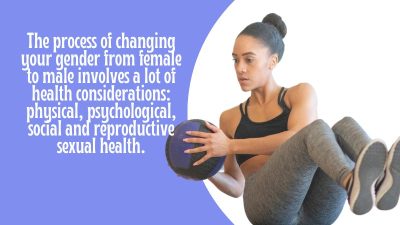
The process of changing your gender from female to male involves a lot of health considerations: physical, psychological, social, and reproductive sexual health. Therefore, as an individual considering the process, ensure you have adequate help and resources that will enable you to transition while having holistic care for body and mind. Also, remember that self-care is an important aspect that will allow you to have a healthy transition.

 Basic Packers
Basic Packers Pack & Play
Pack & Play STP
STP
